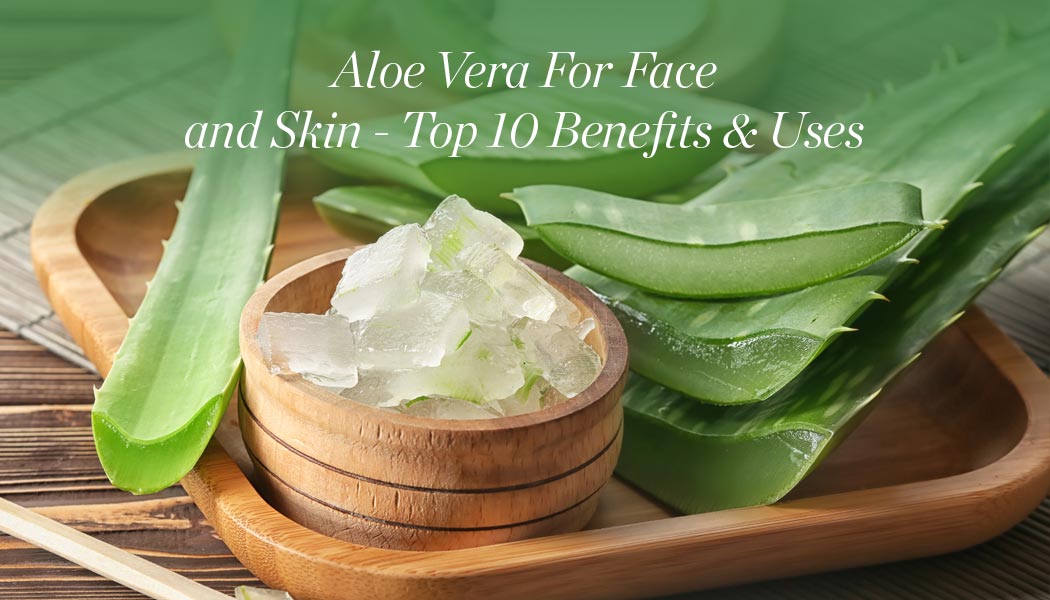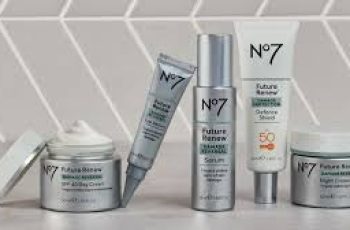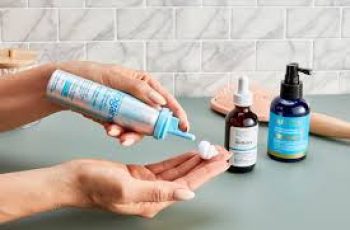What is Aloe Vera? And What Are Its Skin Care Benefits?
Aloe vera may not seem like a great skincare ingredient, but hidden within its juicy green stems is a powerful, moisturizing jelly-like substance that has been a beauty secret since ancient Egypt. What are beauty experts and fans so obsessed with aloe vera? And what are its skin care benefits? Now let’s get started
investigating.
What Are the Benefits of Aloe Vera?
For years, aloe vera has been praised for its beneficial effects on the body inside and out, with many people drinking aloe vera water to hydrate their bodies faster than regular water.
This also has a positive impact on the appearance of the complexion, as it appears plumper and less dry. It also supports digestion, reduces high blood pressure, and boosts the immune system.
Aloe vera is used in many after-sun care products for its powerful moisturizing and cooling properties. Applying aloe vera gel to the skin after a day in the sun can soothe and cool the skin, reducing the risk of sunburn. Prevents sunburn. Overheating the skin and exposing it to the sun can lead to permanent skin damage.
This thick gel is also packed with a variety of skin-strengthening nutrients like minerals, over 10 different vitamins, amino acids, and active botanicals. Not to mention, it has antioxidant and anti-inflammatory properties, making it perfect for taking care of your skin if you suffer from dryness, sunburn, or other skin issues like psoriasis. Acne-prone skin types will also find that large, red, and swollen patches are less likely to appear.
What Does Aloe Vera Do for Your Face?
Considering that there are approximately 420 different types of aloe vera, not all of which have additional benefits, there are many benefits to using aloe vera on your face if used correctly. The aloe vera you find in over-the-counter skin and body care products comes from plant species that are best suited for topical application to the skin.
Also keep in mind that over-the-counter aloe vera gel is formulated with other moisturizing factors and skincare ingredients like calendula and echinacea. Here are some of the main benefits of using aloe vera on your skin. As with all skincare ingredients, it’s best to consult a dermatologist before applying aloe vera to your face.
Benefits of aloe vera for skin are:
Sunburn:
If your skin has burned from overexposure to the sun, applying aloe vera to the affected area can soothe the burn and leave a wonderful cooling sensation. However, since aloe vera does not protect the skin from UV rays, be sure to apply a broad-spectrum sunscreen of SPF 30 or higher before each day in the sun.
Burns and Minor Abrasions:
For minor burns, abrasions, or bumps, applying aloe vera to the affected area can quickly relieve pain and burning sensations about 3 times a day and help the skin heal and regenerate quickly. Dry Skin. The high water content in the thick, prickly leaves is extremely nourishing to the skin, allowing dry skin to absorb moisture quickly.
For best results, replace your regular body moisturizer with aloe vera gel and apply to damp skin to lock in every drop of moisture. Eczema and Psoriasis. Aloe Vera’s Extremely Hydrating Moisturizer
Relieves itchy and uncomfortable skin conditions such as eczema and psoriasis. For best results, apply aloe vera to the affected areas twice a day.
Inflammatory acne.
I am referring to active skin blemishes, i.e. skin blemishes in an inflamed form, such as: B. Pustules that are swollen, red, and tender to the touch. Apply aloe vera gel directly to the pimples with a clean cotton swab about 3 times a day to reduce the size and redness of the pimples.
Can I use aloe vera on my face every day?
If aloe vera works for you and is good for your skin, you can use it on your face every day. However, many people believe that applying aloe vera leaves directly is the most effective and valuable use to really benefit from the fruit. But not everyone has an aloe vera plant at home, so opting for an over-the-counter product is the next best solution.
Some skin care experts believe that skin care products with other skin care ingredients that provide moisture and hydration can make the face look plumper, younger, and reduce signs of aging compared to using the pure aloe vera plant.
What are the side effects of aloe vera?
Many skin and beauty experts believe that aloe vera is safe for topical use. There are no regulations regarding the use of aloe vera. Therefore, as a user, you can decide if it is the best ingredient for your skin. It is well known that skin reactions such as burning sensation, itching, and rashes can occur when aloe vera is applied to the skin.
Therefore, consult your doctor or dermatologist and perform a 24-hour patch test before applying aloe vera all over your skin. It is best not to use aloe vera on severe and open wounds, as there is evidence that aloe vera
impairs the natural healing ability of the skin after surgery and the recovery of deep wounds.
In addition, aloe vera has many benefits for the skin, so it is not surprising that it appears in various sunscreens and moisturizers.
However, this ingredient is still a mystery, and it is recommended to do as much research as possible before applying it to the skin, and don’t forget to keep an eye out for possible improvements. And
With a little extra effort, you may discover a secret ingredient in your daily life!
DQH Knowledge drop: In your 20s, your skin cell turnover decreases. (Cell turnover is a key component in keeping your skin youthful.) You know what else slows down? Your collagen production. Starting in your 20s, collagen decreases by about 1 percent per year. Should you want to prevent fine lines and wrinkles, start by eliminating behaviors that contribute to premature aging. “If it’s bad for you, it’s bad for your skin,” says dermatologist Michel Somenek.
“Cigarette smoking reduces blood flow to the skin and causes premature wrinkling and a dull skin texture. Making the repeated pursed motion to inhale can also cause smoker’s lines. Alcohol and recreational drugs are toxins for the skin that damage its cellular structure and DNA,” Somenek tells us. “The faster you eliminate vices while you are young, the better chance your skin and body have to recuperate.” Also, adopting an anti-aging routine in your 20s is key. After all, the best offense is a good defense. We spoke to Somenek and experts Joshua Ross and Audrey Kunin to find out more.
Keep reading for the best anti-aging products for your 20s, according to skincare professionals.
Sunscreen
“We all know that the sun is the number one cause of skin aging and starting the prevention in your 20s is very important,” Ross says. “The majority of your sun damage won’t start to appear until you’re in your 30s, so don’t wait until you see it surface or you’ll be behind the curve. Stay ahead of it with a good-quality zinc-based sunscreen worn daily.”
Farmacy Green Defense Daily Mineral Sunscreen
An invisible sunscreen with SPF 30, plus botanical extracts meant to protect skin with tons of antioxidants. Bonus: It’s clean and fine to use under makeup.
Bareminerals Complexion Rescue™ Tinted Moisturizer Broad Spectrum SPF 30
Although we recommend you use your SPF and moisturizer separately, we also understand moments when you don’t have time or energy for that extra step. For those times, this bareMinerals moisturizer is a great thing to have on hand.
Vitamin C Serum
“A great introduction to anti-aging is to start with a vitamin C serum in your morning skincare routine,” Ross says. “It’s a powerful antioxidant that will neutralize free radicals and brighten the skin.” He adds that it’s a great way to counteract the effects of the sun’s harmful rays, which, as previously mentioned, are among the biggest causes of premature aging.
Drunk Elephant C-Firma™ Vitamin C Day Serum
The Drunk Elephant C-Firma is a lightweight serum that promises to give skin a glow by combining the brightening powers of vitamin C with ferulic acid, l-ascorbic acid, and vitamin E. The included sodium hyaluronate is meant to replace hydration loss, so you shouldn’t have to deal with any irritation.
Sunday Riley C.E.O. Rapid Flash Brightening Serum
This potent serum is jam-packed with vitamin C (15 percent, to be exact), which means it’s a potential superstar at both brightening skin and dousing it in antioxidants.
Peptides
Using peptides on your skin has many benefits, says Somenek. “The skin barrier is what defends the body against pollution, UV rays, bacteria, and toxins. It can be damaged by several everyday factors. Using topical peptides aids in building a stronger barrier,” he says. “Peptides comprise elastic fibers, which are a type of protein. These fibers help to make skin appear taut and firm. Peptides can also help repair damaged skin, relieve inflammation, and even out skin tone. Some peptides can kill acne-causing bacteria that is common in 20-somethings.”
Kunin agrees, saying, “Peptides are an excellent entry point for supporting collagen.” She recommends looking for face and eye treatments that contain these collagen-boosting powerhouses.
Charlotte Tilbury Magic Eye Rescue Cream
This Charlotte Tilbury super-emollient eye cream has a base of coconut oil and shea butter (read: it’s incredibly hydrating). Botanicals plus peptides are meant to help reduce dark circles and boost collagen, respectively.
This creamy moisturizer serves up potent collagen-boosting peptides and pycnogenol, and antioxidant-rich vitamin C. “Instead of sitting on top of the skin, peptides penetrate the outer layer so they go deep. The ‘signals’ they send tell the cells to produce elastin and collagen, which are needed for youthful-looking skin,” explains Somenek.
At-Home Peel Pads
Remember that skin cell turnover fiasco we talked about earlier? One way to help support it is by exfoliating. “Exfoliation is important to help keep skin fresh and luminous,” Kunin says. She recommends using at-home peel pads as an easy and effective way to exfoliate.
“The goal in your 20s is to fight the slowing pace of cell turnover. It is wise to use products that gently exfoliate, yet still remove oil and other impurities. Products that have Alpha Hydroxy Acids (AHA) or Beta Hydroxy Acids (BHA) are a good choice.”
According to Somenek, you should only exfoliate two to three times a week. “People of all ages are guilty of over-exfoliating and that can be too much of a good thing,” he says.
Dermadoctor Kakadu C Intensive Vitamin C Peel Pad
A few swipes of this Derma Doctor powerful peel pad promise to leave your skin glowing and smooth, thanks to the seven (yes, seven) types of chemical exfoliants, including AHA and BHA. It also contains vitamin C via Kakadu plum extract for added brightening and antioxidant protection.
KEY INGREDIENTS Kakadu plum extract is sourced from the Kakadu plum, a fruit grown in northern Australia. It contains vitamin C, which restores the skin’s natural barrier, increases collagen production, and soothes irritation.
Dr. Dennis Gross Skincare Alpha Beta® Universal Daily Peel Pads
These are the gold standard of peel pads, with a cult following and over 900 five-star reviews on Sephora. They’re easy to use and contain a blend of anti-aging exfoliating acids.
Emollient Night Cream
“In your 20s, you need to start upping the hydration in your skincare routine. You may have been cautious of over-moisturizing because of acne in your teens, but as you enter your 20s, your skin transitions and becomes drier,” Ross says. “I recommend an emollient night cream added into your evening skincare regimen.”
“Twenty-somethings need to make sure that they are not using creams that will clog their pores and cause excess oil production,” says Somenek. Opt for non-comedogenic products.
Cerave Skin Renewing Night Cream
One great choice is the CeraVe Skin Renewing Night Cream, which is a non-comedogenic night cream that leaves skin soft and glowy. It combines the moisturizing powers of ceramides and hyaluronic acid.
RoC Retinol Correxion Max Hydration Creme
“The best night cream ingredients contain retinol, benzoyl peroxide, and/or salicylic acid or hyaluronic acid. The goal is to moisturize, yet remove excess oil,” says Somenek. This Roc Retinol Correxion cream fits the bill as it contains both hyaluronic acid and retinol so it promises to moisturize while also being non-comedogenic.



